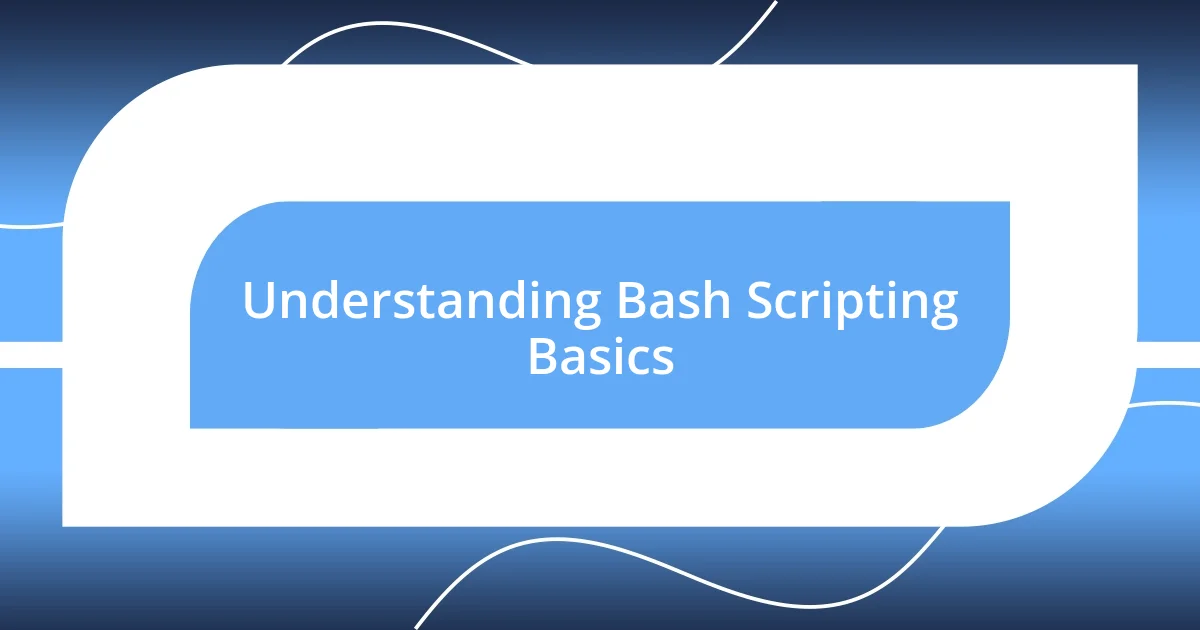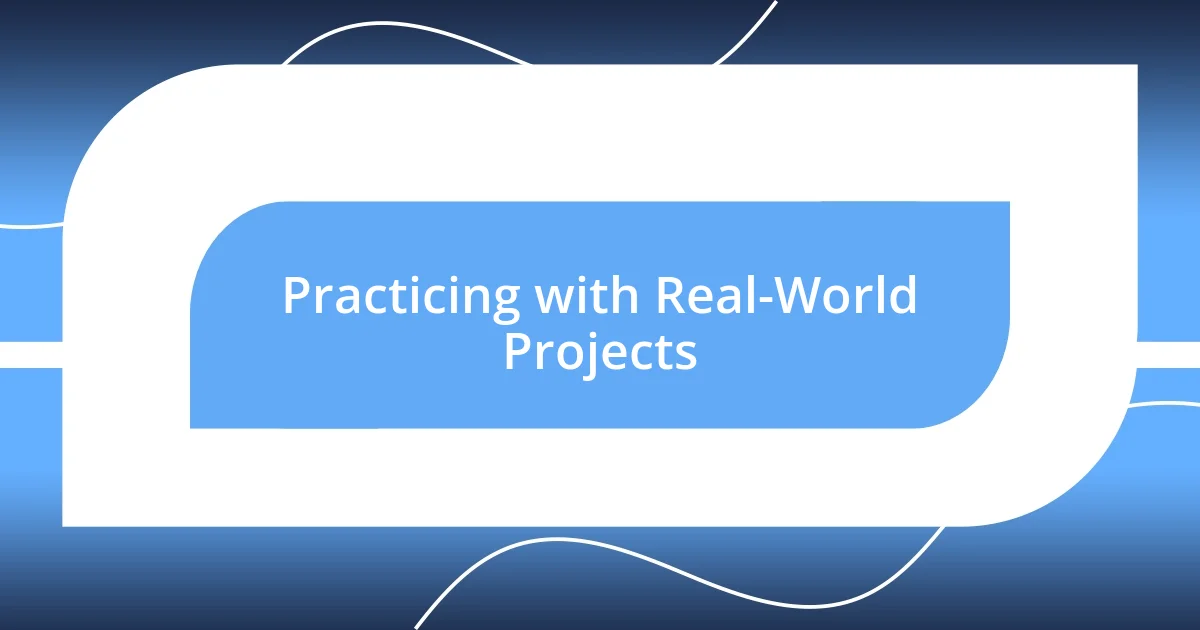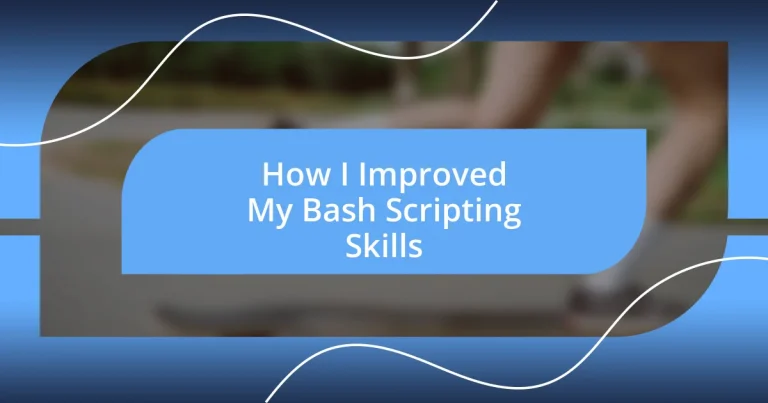Key takeaways:
- Understanding the basics of Bash scripting, including the shebang and variables, was crucial for building a strong foundation.
- Setting SMART goals and seeking feedback from peers and mentors significantly enhanced the learning process and skill development.
- Engaging in real-world projects and utilizing online resources like forums and tutorials accelerated practical knowledge and confidence in scripting.

Understanding Bash Scripting Basics
When I first dipped my toes into Bash scripting, the sheer simplicity of its syntax fascinated me. It’s like learning a new language where each command feels like a small puzzle, waiting to be solved. I remember my initial confusion—what’s a shebang, and why do I need it? That little line at the beginning (#!/bin/bash) actually sets the tone for your script, telling the system that this is a Bash script.
As I explored further, I realized that variables are central to scripting; they allow you to store and manipulate data. I often struggled with remembering to declare variables correctly. But over time, it became exhilarating to see how a simple variable could transform a complex series of commands into an elegant solution. Have you ever been frustrated when a script doesn’t run? I surely have! It taught me the importance of debugging and understanding each line of code.
Learning about loops and conditionals was a game-changer for me. I vividly recall the moment I managed to write a for loop that iterated through a list of files, automating a task that used to take me hours. It was like unlocking a superpower! This realization—how much control I could exert with just a few lines of code—made me appreciate the potential of Bash scripting even more.

Setting Realistic Learning Goals
Setting realistic learning goals has been crucial in my journey with Bash scripting. When I first started, I envisioned becoming a scripting wizard overnight—an ambitious goal for sure! I quickly learned that it’s more effective to break down the learning process into smaller, manageable milestones. For instance, instead of aiming to master the entire scripting landscape, I focused on understanding basic commands, then gradually moved to functions and error handling. This stepwise approach made me feel accomplished and motivated as I ticked off each skill from my list.
I found it beneficial to keep my goals SMART—Specific, Measurable, Achievable, Relevant, and Time-bound. Last year, I set a goal to write a script that automated a repetitive task at work. Instead of just “getting better at Bash,” I committed to learning enough to complete that script within a month. This clear objective guided my learning efforts and kept me accountable. Have you tried setting specific targets? I’ve experienced how much more focused learning becomes when you have a defined outcome you want to achieve.
Another strategy I embraced involved seeking feedback from peers. After completing a small project, I shared my script with a friend who had more experience in Bash. Their insights were invaluable, and it helped me refine my coding style while also pushing me to set new goals for my next project. Engaging with a community or finding a mentor can really motivate you and add a layer of accountability that enhances your learning experience.
| Goal Type | Description |
|---|---|
| Specific | Clearly define what you want to learn, such as mastering loop syntax. |
| Measurable | Establish how you will measure success, like completing a project. |
| Achievable | Aim for realistic goals based on your current skill level. |
| Relevant | Choose goals that align with your overall scripting aspirations. |
| Time-bound | Set a timeline for achieving each learning milestone. |

Utilizing Online Resources Effectively
Exploring online resources has been transformative for me in my Bash scripting journey. I remember initially feeling overwhelmed by the sheer volume of information available. Instead of getting lost, I learned to strategically navigate these resources to enhance my skills. Finding dedicated platforms, community forums, and interactive tutorials helped me to focus on relevant content, making the learning experience both structured and enjoyable.
Here are some strategies that worked wonders for me:
- Participate in Online Forums: Engaging in communities like Stack Overflow or Reddit’s r/bash allowed me to ask questions, share my scripts, and receive feedback. These interactions enriched my understanding and built my confidence.
- Utilize Video Tutorials: YouTube channels dedicated to Bash scripting broke down complex concepts into digestible videos, making it easier to follow along.
- Follow Blogs and Documentation: I learned the importance of diving into official documentation and blogs that offered practical examples. One blog post on array handling, for instance, opened my eyes to new possibilities in scripting.
- Practice with Real Projects: By finding project ideas online that aligned with my goals, I could apply what I’d learned immediately. It’s about combining theory with practice to truly solidify knowledge.
I still vividly recall stumbling upon a video series that led me to create my first real-world automations. It felt surreal to see a script I wrote significantly cut down my workload, and I couldn’t help but share that excitement with my friends! Each resource I utilized not only bolstered my skills but also fueled my passion for scripting.

Practicing with Real-World Projects
Engaging in real-world projects was a game changer for my Bash scripting skills. I remember feeling a rush of excitement when I first tackled a task that directly impacted my work. For instance, automating a backup process saved me countless hours, and that immediate gratification was the perfect boost to my confidence. Have you ever experienced that “aha!” moment when your script actually does what you envisioned? It’s incredibly rewarding.
Taking on projects that resonate with my interests made the learning process enjoyable. I started with simple scripts, like renaming a batch of files in a specific format. With each successful execution, my eagerness to tackle more complex projects grew. I then ventured into creating scripts that managed my personal finances, allowing me to see trends and make better budgeting decisions. I found that working on projects that were relevant to my life not only solidified my learning but also kept me motivated.
Collaboration also played a huge role in my development. I reached out to a colleague interested in scripting and we decided to create an internal tool together. This experience was an eye-opener; not only did I learn new techniques from my partner, but I also gained insights into the importance of code readability and documentation. It’s an incredible feeling to collaboratively build something that improves workflows—what project have you collaborated on that made an impact? Sharing ideas and challenges with a partner truly deepens your understanding and sparks creativity along the way.

Joining Community Forums and Groups
Joining community forums and groups has been one of the most rewarding experiences in enhancing my Bash scripting skills. I vividly remember the first time I introduced myself on a scripting forum; a mix of nerves and anticipation filled me. What surprised me most was how welcoming the community was. The feedback and support I received from experienced members not only improved my scripts but also made me feel like I belonged to a shared journey.
Engaging in discussions about problem-solving in these forums often provided insights I hadn’t considered. For example, while helping someone troubleshoot a script, I stumbled upon a much more efficient method than my own approaches. It occurred to me that collaboration within these forums created an environment rich with diverse perspectives. Don’t you love when you learn something new just by sharing knowledge? That’s precisely the magic of being part of a community.
Additionally, I found that joining several dedicated Slack groups kept me motivated. The dynamic conversations and real-time feedback could turn a daunting day into a productive one in no time. Just a few weeks ago, I posed a question regarding error handling in scripts, and the plethora of responses helped me refine my approach dramatically. It’s not just about what I learned; the camaraderie and support made it feel less isolating. Has there ever been a moment in your learning journey where a community’s support significantly impacted your progress? I can confidently say that each interaction has propelled me further down the path of mastering Bash scripting.

Seeking Feedback and Refinement
Seeking constructive feedback was pivotal in refining my Bash scripting skills. I remember nervously sharing my scripts with a mentor who had a wealth of experience. To my surprise, their suggestions were valuable, highlighting areas for improvement I hadn’t even considered. Isn’t it amazing how an outsider’s perspective can shine a light on blind spots? Those insights pushed me to tweak my code for efficiency and clarity.
After getting feedback, I made it a practice to revisit my earlier scripts. Each review session served not only as a learning opportunity but also as a chance to witness my growth. I found myself thinking, “Wow, I wouldn’t have implemented that solution a few months ago!” It felt gratifying to see how my efforts were gradually paying off. This reflection process became a motivating factor, fueling my desire to continually refine and enhance my scripts even further.
I also sought feedback from peers regularly—it was like opening a treasure chest of ideas. One time, a colleague suggested a different approach to error handling in my script. This prompted a deep dive into best practices that I hadn’t considered. Asking for feedback transforms your learning journey into a collaborative adventure, doesn’t it? The more I engaged with others, the more refined my scripting became, leading to a richer understanding of Bash itself.

Continuing Education and Advanced Topics
Continuing my education in Bash scripting has opened up a world of advanced topics that I find both challenging and exhilarating. I remember diving into regular expressions—at first, I felt overwhelmed by the complexity, like standing at the base of a towering mountain. However, as I gradually practiced, each new concept became a stepping stone that led me to a broader understanding of how powerful Bash can be. Have you ever faced a daunting topic, only to find that a little persistence transforms it into a manageable challenge? That’s exactly how I felt with regex.
I also sought out online courses that focused on more sophisticated scripting techniques. One course explored automation and scheduling tasks with cron jobs, and I was instantly hooked. The moment I successfully automated a mundane task, I felt an immense sense of accomplishment. Can you recall a moment when you realized you’d saved time and effort through automation? Those experiences made me appreciate how Bash scripting can not only optimize workflows but also provide a sense of creativity in tackling problems.
Additionally, exploring open-source projects enriched my learning immensely. Contributing to one such project was like being tossed into the deep end of a pool; it felt intimidating at first. But as I navigated the code and engaged with other contributors, I discovered advanced scripting patterns and best practices that I’d never encountered before. It was a whirlwind of learning—every pull request was an opportunity to grow. Have you ever been part of a collaborative project that pushed you beyond your comfort zone? For me, those moments turned my learning journey into an adventure filled with discovery and excitement.














